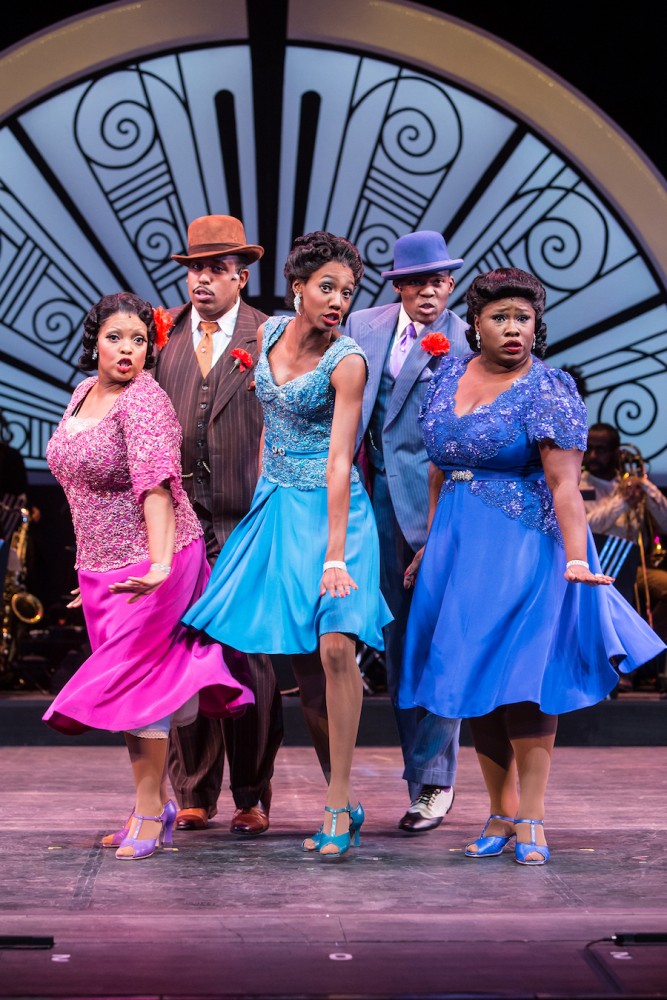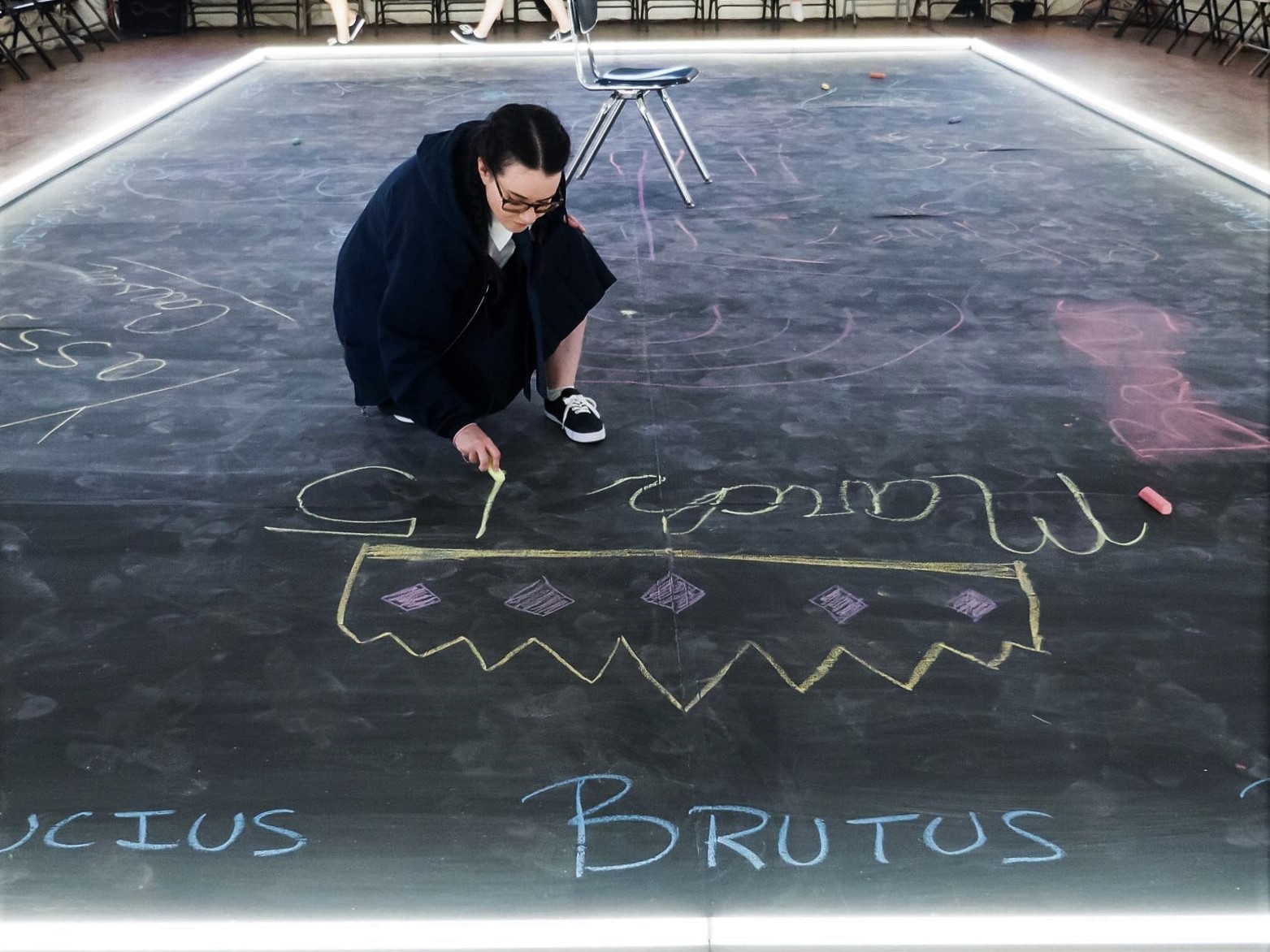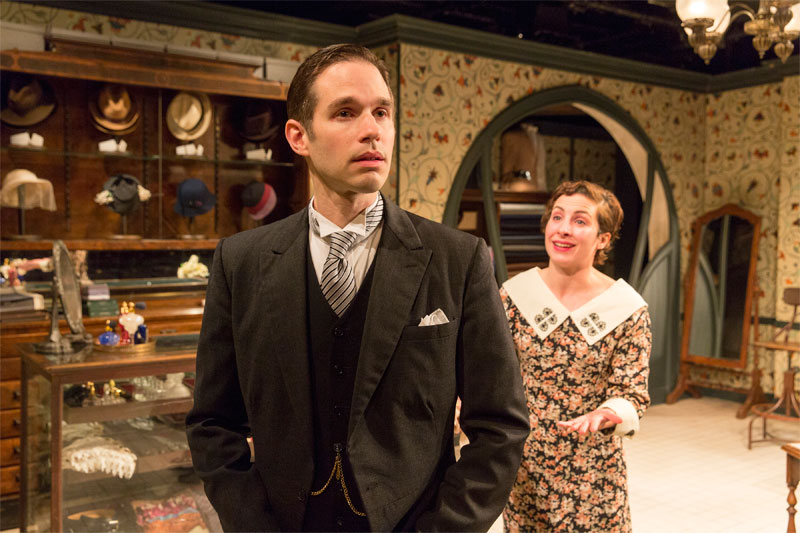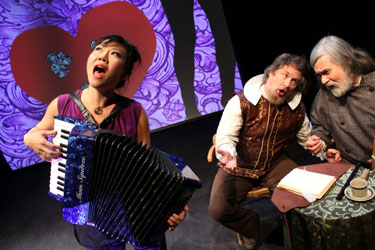Review by Samuel L. Leiter
The eponymous city is Paris, best known as the City of Lights or the City of Love, but neither is ever mentioned in the Playwrights Realm production of Anton Dudley’s lusterless new play at the Peter Jay Sharp Theater, despite its mantra “City of, city of . . . ,” repeated dozens of times. We do learn, however, that Paris is not only the city “of tangible dreaming,” but the city of dirt, dreams, memory, art, hell, whores, hounds, people, history, and so on, including “monsters and monstrous things cruel.” These words can be taken literally or not since City Of is a dream play, nonrealistic and filled with poetic ambiguity, mystery, and allusion. What it is not, however, is dramatic or, except for scattered moments, theatrically absorbing.
Dudley’s program note states that he was inspired by Henri Rousseau’s famous painting, “The Dream,” which plays a role in City Of, and by the French phrase for twilight, which translates as “between dog and wolf.” He declares that he began the play “as an exploration of life in The In-Between,” which seems more real to him than what we perceive as reality: “We spend much of our lives in a state similar to dream.” Rousseau, he adds, observed that the naked woman in his painting isn’t actually lying in the jungle, she’s only dreaming there. Thus the play attempts to take us into the dream world of his four central characters, although we have no idea of whose dream it is; in fact, to use Rousseau’s example, we might even wonder if the play, set almost entirely in Paris, is actually taking place there or if it’s not merely a conglomeration of dreams about the city of—whatever—by each of Dudley’s main characters.
It begins at New York’s Museum of Modern Art, whose acronym, MOMA, is thematically linked to the mommy issues of two young men—Claude (Jon Norman Schneider) and Dash (Devin Norik), whose late mother was a renowned art collector. After meeting while viewing Rousseau’s painting, they meet again on a plane to Paris, and then in the city itself. They fall in love and Claude moves into Dash’s pied-à-terre.
Also on the plane are a young American woman, Cammie (Colby Minifie), and an older, British-accented librarian, Eleanor (Suzanne Bertish), searching for the ghost of her father, a Parisian bookbinder. Cammie’s obsessed with the idea of singing at the Paris Opera, and insists that everyone promise to see her when she appears. In keeping with the absurdist tone pervading the play, her singing voice is in her handbag, and can be heard bursting into song when she opens it.
In Paris, the characters undergo various trials and tribulations, such as Claude’s nightmarish streak through the frigid streets in his underwear, where he meets a Cockney streetwalker (Cheryl Stern) who turns out to be his long-lost mother. There’s also Cammie’s descent into the city’s fabled sewers, symbolic of a tour through hell, until she emerges onto the stage of the Paris Opera. Much of what happens is connected to the three stages (as per Oscar Wilde’s definition) of absinthe indulgence, including a Tinkerbell-like Green Fairy played by a small green light on actress Stern’s finger. Strained infusions of comedy, like the scenes between a Notre Dame gargoyle (Rattazzi) and the pigeon (Stern) he’s in love with, attempt to lighten the mood. (Rattazzi and Stern play multiple roles.)
Dudley’s dialogue, much of it in verse, is often elliptical, and many passages are orchestrated for two or more voices to speak simultaneously. While there’s a more or less linear narrative, and the characters have generally recognizable through-lines, everything leans toward surrealistic bizarreness. Fortunately, director Stephen Brackett does a reasonably effective job of creating an appropriate dreamlike atmosphere, and he’s assisted by Cameron Anderson’s stylized unit set and Brian Tovar’s highly evocative lighting, the latter being the production’s most distinctive contribution.
The well-qualified cast (especially the always noteworthy Bertish) does a good job of trying to bring an internal reality to their roles, but it’s nearly impossible to relate to the dialogue and circumstances. Well before this overly precious play’s ninety intermissionless minutes are over, you may be experiencing a more engrossing dream inside your own head.
City Of
Playwrights Realm
Peter Jay Sharp Theater
416 W. 42nd Street, NYC
Through February 21

























